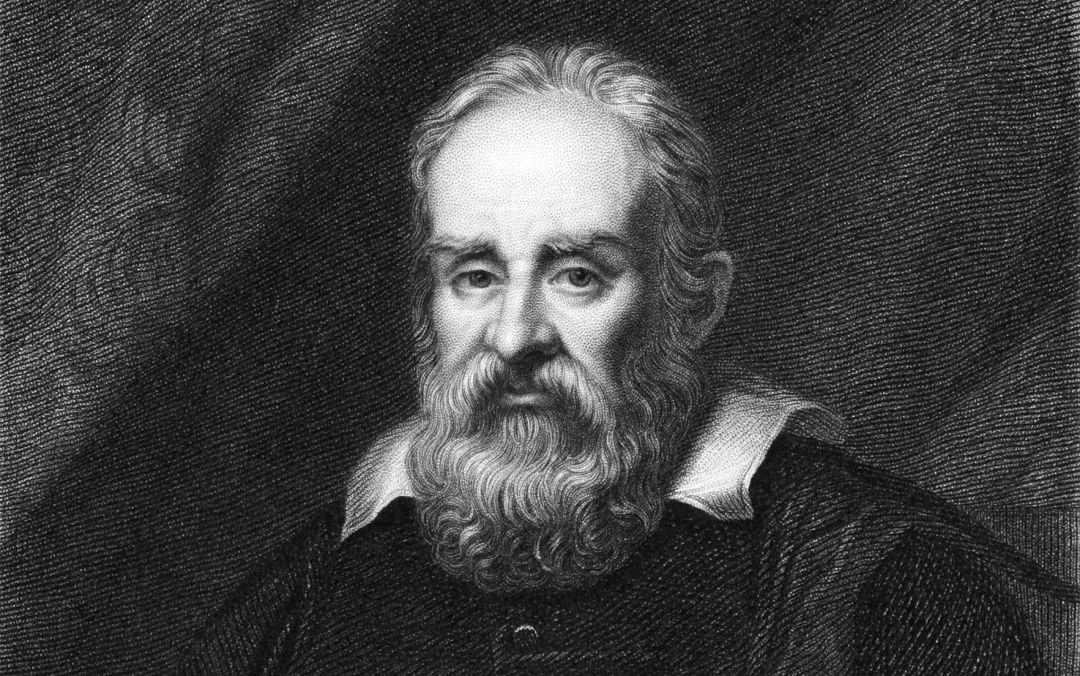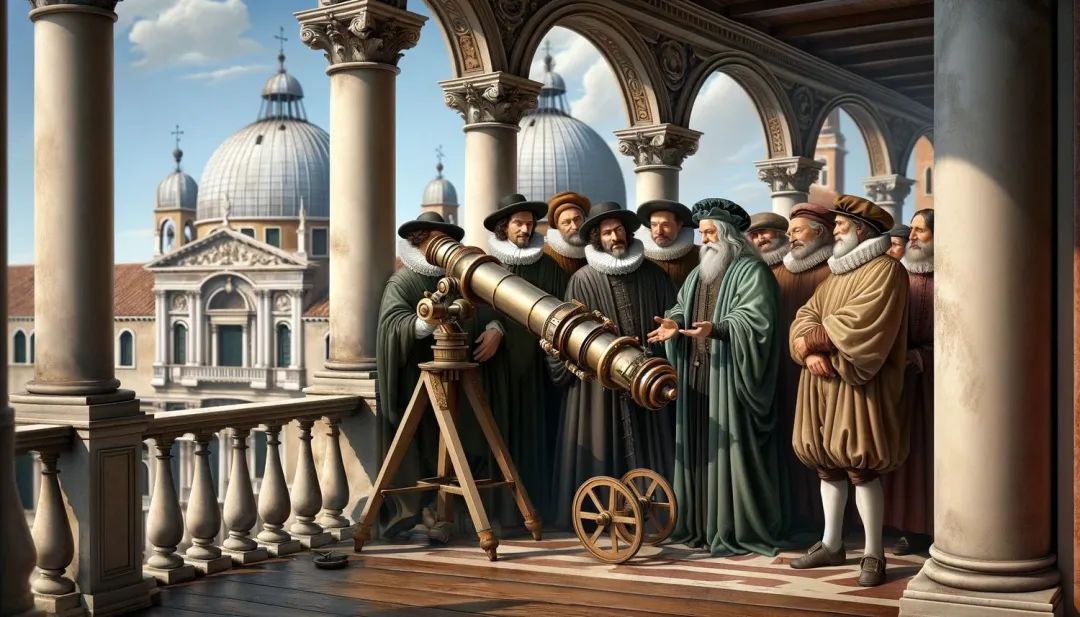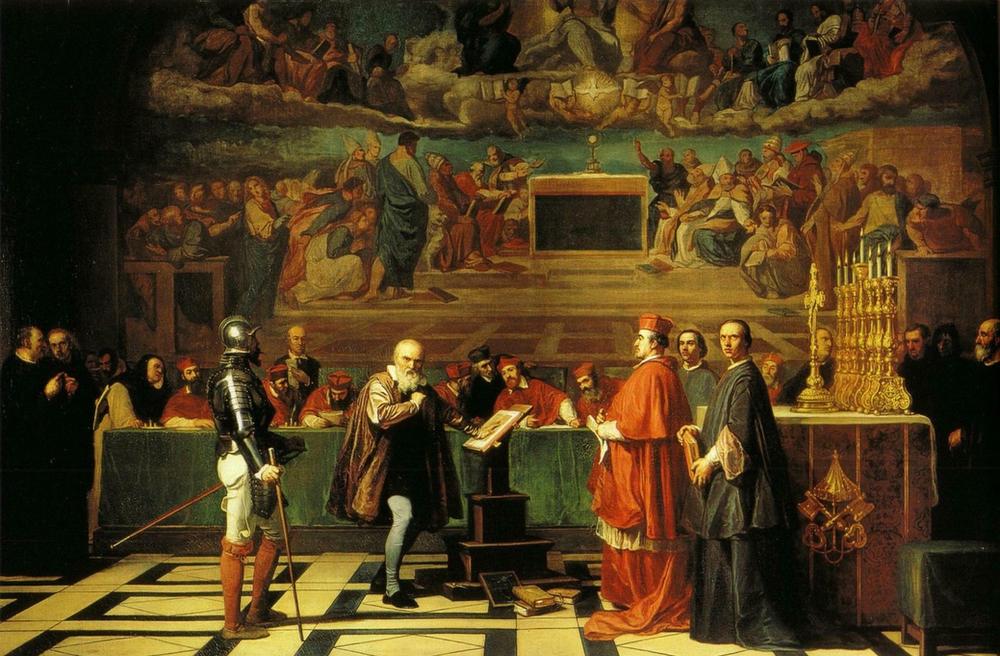【背单词】

【往期回顾】
英汉双语阅读105:为何雕塑是跳出 “框框” 的三维魔法秀?
【本期内容】
Galileo and the birth of modern science
伽利略与现代科学的诞生

一、生词准备
1. cosmology /kɒzˈmɒlədʒi/ n. 宇宙学
2. inquisition /ˌɪŋkwɪˈzɪʃn/ n. 宗教裁判所
3. philosophy /fəˈlɒsəfi/ n. 哲学
4. Copernican /ˌkɒpəˈnɪriən/ adj. 哥白尼的
5. evidence /ˈevɪdəns/ n. 证据
6. publicly /ˈpʌblɪkli/ adv. 公开地
7. universities /ˌjuːnɪˈvɜːrsɪtiːz/ n. 大学
8. theological /ˌθiːəˈlɒdʒɪkl/ adj. 神学的
9. ecclesiastical /ɪˌkliːziˈæstɪkl/ adj. 教会的
10. repressive /rɪˈpresɪv/ adj. 镇压性的
11. allegorical /ˌælɪˈɡɒriəl/ adj. 寓言的
12. scandal /ˈskændl/ n. 丑闻
13. schism /ˈskɪzəm/ n. 分裂(通常用于宗教或政治)
14. acquiesce /ˌækwiˈes/ vi. 默许
15. diplomacy /dɪˈplɒməsi/ n. 外交手腕
16. contravene /ˌkɒntrəˈviːn/ vt. 违反
17. renounce /rɪˈnaʊns/ vt. 放弃
18. diplomacy /dɪˈplɒməsi/ n. 外交手腕
19. genesis /ˈdʒɒnɪsɪs/ n. 起源
20. smuggle /ˈsmʌɡl/ vt. 走私
21. manuscript /ˈmænjuskrɪpt/ n. 手稿
22. major /ˈmeɪdʒə(r)/ adj. 主要的
23. acquiescence /ˌækwiˈesns/ n. 默许
24. omnipotence /ɒmˈnɪpətəns/ n. 全能
25. contravention /ˌkɒntrəˈvenʃn/ n. 违反
26. diplomacy /dɪˈplɒməsi/ n. 外交手腕
27. philosopher /fəˈlɒsəfə(r)/ n. 哲学家
28. allegorically /ˌælɪˈɡɒriklɪ/ adv. 寓言式地
29. repression /rɪˈpreʃn/ n. 压制
30. censorship /ˈsensəʃɪp/ n. 审查制度
二、短文内容
A few years ago, Pope John Paul II told a cosmology conference at the Vatican that scientists should not study the beginning of the universe because it was the work of God.
"It’s OK to study the universe and where it began,” said the Pope, “but we should not inquire into the beginning itself because that was the moment of creation and the work of God."
I was glad John Paul did not realize that I had presented a paper at the same conference suggesting how the universe began, because I didn’t fancy the thought of being handed over to the Inquisition like Galileo.
The astronomer’s renowned conflict with the Catholic Church was central to his philosophy. Galileo was one of the first to argue that man could hope to understand how the world works, and, moreover, that we could do this by observing the real world. Galileo, perhaps more than any other single person, was responsible for the birth of modern science.
Galileo had believed Copernican theory (that the planets orbited the sun) since early on, but it was only when he found the evidence needed to support the idea that he started to publicly support it. He wrote about Copernicus’s theory in Italian (not the usual academic Latin), and soon his views became widely supported outside the universities.
This annoyed the Aristotelian professors, who united against him seeking to persuade the Catholic Church to ban Copernicanism. Galileo, worried by this, traveled to Rome to speak to the ecclesiastical authorities. He argued that the Bible was not intended to tell us anything about scientific theories, and that it was usual to assume that, where the Bible conflicted with common sense, it was being allegorical.
But the Church was afraid of a scandal that might undermine its fight against Protestantism, and so took repressive measures. It declared Copernicanism "false and erroneous" in 1616, and commanded Galileo never again to "defend or hold" the doctrine. Galileo acquiesced.
In 1623, a longtime friend of Galileo’s became the pope. Immediately Galileo tried to get the 1616 decree revoked. He failed, but he did manage to get permission to write a book discussing both Aristotelian and Copernican theories, on two conditions: he would not take sides and would come to the conclusion that man could in any case not determine how the world worked because God could bring about the same effects in ways unimagined by man, who could not place restrictions on God’s omnipotence.
The book, Dialogue Concerning the Two Chief World Systems, was completed and published in 1632, with the full backing of the censors-and was immediately greeted throughout Europe as a literary and philosophical masterpiece. Soon the pope, realizing that people were seeing the book as a convincing argument in favor of Copernicanism, regretted having allowed its publication. The pope argued that although the book had the official blessing of the censors, Galileo had nevertheless contravened the 1616 decree. He brought Galileo before the Inquisition, who sentenced him to house arrest for life and commanded him to publicly renounce Copernicanism. For a second time, Galileo acquiesced.
Galileo remained a faithful Catholic, but his belief in the independence of science had not been crushed. Four years before his death in 1642, while he was still under house arrest, the manuscript of his second major book was smuggled to a publisher in Holland. It was this work, referred to as Two New Sciences, even more than his support for Copernicus, that was to be the genesis of modern physics.

三、短文注释
1. Pope John Paul II's statement:教皇约翰·保罗二世的声明。教皇约翰·保罗二世曾表示科学家不应研究宇宙的起源,因为那是上帝的工作。这一观点出现在文章开头,强调了宗教与科学之间的界限。
2. Galileo's conflict with the Church:伽利略与教会的冲突。伽利略因支持哥白尼的日心说而与天主教会发生冲突。这一冲突是文章的核心主题之一。
3. Copernican theory:哥白尼理论。哥白尼的日心说理论提出太阳是宇宙的中心,而非地球。这是伽利略支持的理论。
4. Galileo's support for Copernicus:伽利略支持哥白尼。伽利略积极支持哥白尼的理论,并通过观测和实验为其提供证据。这是他职业生涯的重要部分。
5. evidence-based science:基于证据的科学研究。伽利略强调科学应基于观察和实验得出的证据。这是他推动科学革命的关键理念。
6. Galileo's use of Italian:伽利略使用意大利语。伽利略用意大利语而非拉丁语写作,使他的作品更易于被普通读者理解。这一做法在当时是创新的。
7. Aristotelian professors' opposition:亚里士多德学派教授的反对。亚里士多德学派的教授反对哥白尼的理论,因为他们坚信地心说。这是伽利略面临的主要学术阻力。
8. Galileo's trip to Rome:伽利略前往罗马。伽利略前往罗马与教会当局对话,试图说服他们接受哥白尼的理论。这是他职业生涯中的一个关键时刻。
9. biblical allegory:圣经寓言。伽利略认为圣经不应被用来解释科学理论,而是应被视为寓言。这是他与教会争论的一个关键点。
10. repressive measures against Copernicanism:对哥白尼理论的镇压措施。教会对哥白尼理论的镇压措施,包括禁止其传播和教学。这是教会为了维护其权威而采取的行动。
11. 1616 Decree:1616年法令。教会宣布哥白尼理论为“错误和谬误”,并禁止伽利略进一步支持该理论。这是伽利略职业生涯中的一个转折点。
12. Galileo's acquiescence:伽利略的默许。伽利略被迫默许教会的决定,放弃公开支持哥白尼理论。这是他在压力下的妥协。
13. Maffeo Barberini becoming Pope Urban VIII:马费奥·巴贝里尼成为教皇乌尔班八世。伽利略的朋友马费奥·巴贝里尼成为教皇乌尔班八世,伽利略希望借此机会恢复对哥白尼理论的支持。这是他试图重振事业的尝试。
14. Galileo's request to revoke the decree:伽利略请求撤销法令。伽利略请求撤销1616年的法令,但未能成功。这是他未能实现的目标。
15. permission to write a book:写书的许可。伽利略获准撰写讨论两种世界体系的书,但条件是他不得偏袒任何一方。这是他在限制下进行创作的条件。
16. Dialogue Concerning the Two Chief World Systems:《关于两大世界体系的对话》。该书是伽利略的著作,尽管受到审查,但仍被视为文学和哲学的杰作。这是他在文学上的成就。
17. censorship and publication:审查与出版。尽管受到审查,该书仍得以出版,并在欧洲广受欢迎。这是他在逆境中的成功。
18. Pope's regret over publication:教皇对出版的后悔。教皇后悔允许该书出版,因为它被视为支持哥白尼理论的有力论据。这是教会对他作品的反应。
19. Inquisition trial:宗教裁判所审判。伽利略被带到宗教裁判所受审,被迫放弃哥白尼理论。这是他职业生涯的悲剧性结局。
20. house arrest:软禁。伽利略被判终身软禁,但继续从事科学研究。这是他在晚年继续工作的状态。
21. public renunciation of Copernicanism:公开放弃哥白尼理论。伽利略被迫公开放弃哥白尼理论,但他内心仍然相信日心说。这是他在压力下的无奈之举。
22. Galileo's continued faith:伽利略的持续信仰。尽管遭受迫害,伽利略仍保持对天主教的忠诚。这是他个人信仰的表现。
23. independence of science:科学的独立性。伽利略坚信科学应独立于宗教,这一信念在他的一生中始终如一。这是他的核心理念。
24. Two New Sciences:《两种新科学》。伽利略的另一部重要著作,对现代物理学的发展产生了深远影响。这是他在科学上的另一大贡献。
25. genesis of modern physics:现代物理学的起源。伽利略的工作被认为是现代物理学的起源之一。这是他对科学发展的贡献。
26. manuscript smuggling:手稿偷运。伽利略的手稿被偷运到荷兰出版,以避免审查。这是他在逆境中坚持创作的手段。
27. scientific revolution:科学革命。伽利略和其他科学家的努力推动了科学革命,改变了人们对世界的理解。这是他的历史影响。
28. observational astronomy:观测天文学。伽利略通过望远镜进行的天文观测,为现代天文学奠定了基础。这是他的科学方法。
29. empirical evidence:经验性证据。伽利略强调基于观察和实验的证据,这一方法成为现代科学研究的核心。这是他的科学理念。
30. philosophical implications of science:科学的哲学影响。伽利略的科学工作对哲学产生了深远影响,推动了理性主义和经验主义的兴起。这是他的思想遗产。

【Source】www.inventionandtech.com
【Translated by】Spark Liao (廖怀宝)
【Illustration】From Bing

